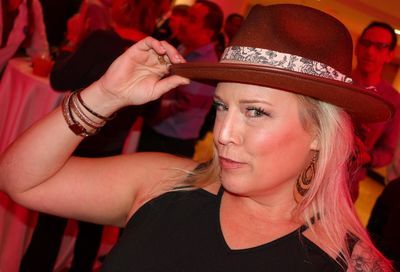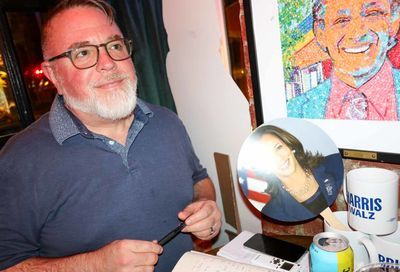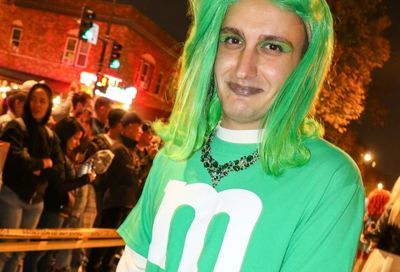‘Luther: Never Too Much’ Celebrates the Legacy of an R&B Giant
The documentary "Luther: Never Too Much" layers its comprehensive bio of Luther Vandross with an astute history of R&B.

Luther: Never Too Much is set for a TV and streaming premiere in 2025, but Luther Vandross lovers and other aficionados of R&B are best served by seeing this music-filled documentary, directed by the prolific Dawn Porter (John Lewis: Good Trouble), while it’s in theaters, on a big screen with big sound.
Among real Luther fans — some of whom will invariably, and understandably, feel compelled to sing along to the film’s prime performance clips — one might experience the powerful currents of emotion transmitted through the late singer-songwriter’s voice and music. “I can’t think of anybody that is near to him,” says Mariah Carey, praising his tone, uniqueness, and talent.
Carey’s fond praise of his vocal prowess is perfectly supported by footage of the pair performing their version of duet “Endless Love” live onstage. Dionne Warwick explains that she loved that when Luther covered a song, he made it his own.
Mariah and Dionne, as with the film’s other marquee interview subjects, from Nile Rodgers to Luther co-producer Jamie Foxx, appear in warm, well-produced solo shots, to elucidate Luther’s attributes as a vocalist, and relate backstage stories.
His inner circle of friends and collaborators, like fellow singers Fonzi Thornton and Robin Clark, who toured with him, and toiled with him in the studio, offer a more intimate look at the work ethic that propelled his platinum-selling, Grammy-winning career. But first, following a concise intro to his superstardom, the film explores the singer’s origins as a kid from the Bronx, New York, who came of age in the 1960s.
“I was a Motown child,” Luther informs the audience in an old clip, before a sharp cut to The Supremes performing “You Can’t Hurry Love” on The Ed Sullivan Show. Porter and editor Mark Fason are predictable in their timing, but the performance footage is consistently well-chosen and insightful, particularly in references to the greats Luther studied as he nurtured his art and entered the business.
Perhaps the film’s strongest storytelling comes with reviving the lesser-known chapters of Luther’s early career, much of it narrated in his own words, from TV and radio interviews. Intercut with contemporary interviews of friends Thornton and Clark, and Carlos Alomar, also a musician, Luther takes us back to the days of their first singing group, Listen My Brother, an uplifting ensemble devoted to songs about being young and Black.
An opportune brush with Jim Henson leads to Listen My Brother making regular appearances on Sesame Street, just one of the pre-stardom gems the documentary brings out for display, like the generous slices of behind-the-scenes footage of a green, young Luther working with David Bowie on the glam rocker’s 1975 soul album Young Americans.
Starting on the album as a session background singer, Luther’s contributions ultimately also earned him a credit for arranging the album vocals. That included the track “Fascination,” a Bowie hit that re-worked Luther’s “Funky Music,” a song he wrote for his short-lived group, also called Luther.
The film builds beautifully in this passage, name-dropping the legendary artists and classic songs that Luther backed up or wrote for in his rise to the top, the commercial jingles he got rich singing, and his breakout on the charts in the studio group Change. Then, finally, in 1981, he debuted his first solo album, Never Too Much, and, like a superhero, rocketed to the stratosphere.
Covering Luther’s superstar era with montages of trips to Oprah and Carson and similarly televised success, the film doesn’t shoot too far outside the box, or inside his personal life, relaying his years of plenty. Although, Porter does capture Luther’s private setbacks with a frank, if not lingering, gaze.
Quickly discussing, not really rehashing, the 1986 auto accident with Luther at the wheel that resulted in the death of his passenger, 27-year-old West Hollywood resident Lawrence Salvemini, the film spends more time on the star’s tortured relationship with his weight.
Luther had strong opinions about the fact that his detractors and fans had such strong opinions about his weight and expressed them so loudly. Cut to a vintage clip of Cedric the Entertainer doing a routine about preferring Big Luther to Little Luther.
That’s a discussion familiar to many Luther fans, as are the speculations about the man’s sexuality, since he famously never had a public relationship. He talked about his love life in clips shown here, revealing that his favorite of his songs, “Any Love,” expressed his truest self, and his feeling that he’d never found any one great romantic love, and he might never find that person.
About rumors that he might be gay, he asserted in an interview, “I will neither deny or confirm any such rumors,” before adding, “Mind your fucking business.” He put it all in the music, he insists, and the film supports his case.
“His legacy will live on forever,” declared Warwick at his memorial in 2005. Such is the power of love, and of great artistry.
Luther: Never Too Much (★★★☆☆) is playing in select theaters, and will premiere on CNN, OWN, and Max in 2025. Visit www.fandango.com, or www.max.com.
Support Metro Weekly’s Journalism
These are challenging times for news organizations. And yet it’s crucial we stay active and provide vital resources and information to both our local readers and the world. So won’t you please take a moment and consider supporting Metro Weekly with a membership? For as little as $5 a month, you can help ensure Metro Weekly magazine and MetroWeekly.com remain free, viable resources as we provide the best, most diverse, culturally-resonant LGBTQ coverage in both the D.C. region and around the world. Memberships come with exclusive perks and discounts, your own personal digital delivery of each week’s magazine (and an archive), access to our Member's Lounge when it launches this fall, and exclusive members-only items like Metro Weekly Membership Mugs and Tote Bags! Check out all our membership levels here and please join us today!






















You must be logged in to post a comment.